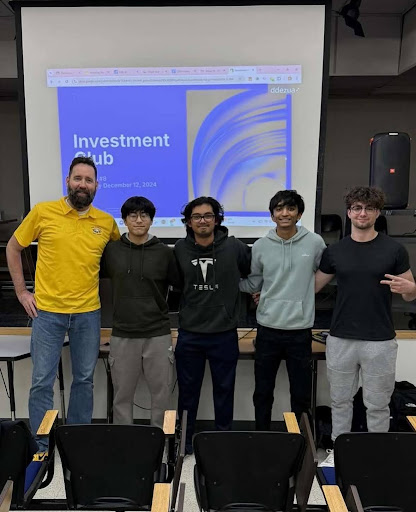At Sandburg, business education extends well beyond the classroom. Students have the chance to join organizations like DECA (Distributive Education Clubs of America), BPA (Business Professionals of America), and the Investment Club. Each of these provides unique opportunities to develop leadership, learn real-world skills, and prepare students for life after graduation.
DECA has long been one of Sandburg’s largest and most competitive clubs. Sponsor Ms. Vandenberg explained, “DECA is a business marketing club that covers a variety of business topics for students to compete in.” Members select areas such as entrepreneurship or hospitality, then prepare role-play scenarios, take business tests, or present long-term projects such as 20-page business plans to judges who are professionals in their fields.
Participation in the club is widespread. Between the career internship program and the club itself, more than 100 students are currently involved in DECA at Sandburg. Competitions begin at the regional level and can lead to state and national competitions, where students from across the U.S. and other countries come together. “Last year we took students to Florida for nationals, and this year it’s in Georgia,” Ms. Vandenberg said. “It’s an incredible experience seeing thousands of students compete on a global stage.”
Vandenberg emphasized the confidence and communication skills members develop along the way. “Almost like when you first apply for a job, an employer can ask you, ‘Why should we give you this job?’ DECA puts you in that position where you have to think quickly and present yourself professionally,” she said. “Students learn how to think on their feet, get comfortable speaking with adults, and make connections with other students from across the country. Those experiences prepare them for college, careers, and beyond.”
While DECA pushes students to compete, the Investment Club takes a different but equally valuable approach. Sponsor Mr. Bickham described it as “a club that gives young people an opportunity to just learn about ways to financially plan for their future.” With a focus on the stock market, students learn about stocks, ETFs (exchange-traded funds), and other investment tools that most students wouldn’t encounter until much later in life. “The earlier you start investing, the easier and less stressful it’s going to be as an adult,” Bickham said.

To practice skills learned through lessons, members participate in a stock market simulation where each student manages a $100,000 virtual portfolio. In addition to club-led learning, guest speakers from the financial industry also share their expertise, and past members have even taken field trips to places like Google’s Chicago headquarters. Bickham says, “I didn’t really start learning about this stuff until I was in my master’s program at the age of 23 or 24. These kids are learning it at 15 or 16, and it’s going to make their road to an easier financial life so much smoother.”
The impact of the Investment Club has been long-lasting for many of its members. Nico Vazzana says, “As a freshman, I saw this club as a perfect opportunity to learn the basic fundamentals of the market.” Students gain confidence in future plans and learn new things about a field of study they enjoy. Vazzana now plans to pursue a career in finance or investment banking, and he credits the club for giving him a head start. “This club had the greatest impact on me out of any I’ve participated in,” he added.
Similarly, BPA offers its own unique path for business-minded students. The organization is part of a nationwide network that focuses on leadership, technical skills, and career readiness. Students can compete in dozens of different events ranging from accounting and finance to digital communication, entrepreneurship, and marketing. These competitions give members the chance to showcase specialized skills and often require both tests and presentations.

In addition to contests, BPA emphasizes professional skills. Members frequently prepare resumés, practice interview skills, and connect with mentors in the business world. For Sandburg students, it serves as a bridge between classroom learning and professional goals, helping them develop practical skills that employers and colleges look for.
Together, these three organizations create a space for business students to push themselves beyond the classroom. Whether it’s the competitive challenges of DECA, the financial lessons of Investment Club, or the career-building opportunities of BPA, Sandburg’s business clubs prepare students to step confidently into the future.
As Ms. Vandenberg put it, “These clubs aren’t just about winning competitions or building a résumé. They’re about discovering your passions and realizing what you’re capable of.”

